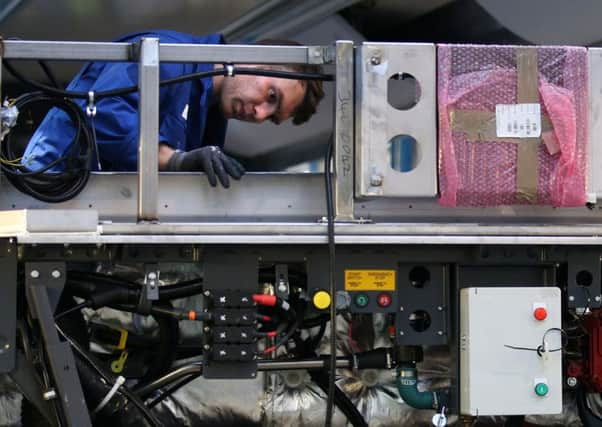Manufacturing output slumps to three-year low


Economists said today’s bleak industrial data could give the Bank of England more impetus to unveil further fiscal stimulus this Thursday, after it surprised markets by holding fire on an interest rate cut last month.
The closely-watched Markit/Cips manufacturing purchasing managers’ index (PMI) fell to levels last seen in February 2013 as it hit 48.2 in July, down from 52.4 the month before and below economists’ expectations of 49.1. Any reading above 50 denotes growth.
Advertisement
Hide AdAdvertisement
Hide AdMeasures of output and new orders fell below the 50 mark for the first time since early 2013 due to weaker market conditions at home and uncertainty related to June’s EU referendum.
The latest report also showed that the rate of job losses across the sector was its second-sharpest for almost three-and-a-half years.
Rob Dobson, senior economist at Markit, said the downturn was industry-wide with output scaled back across firms of all sizes.
“The pace of contraction was the fastest since early 2013 amid increasingly widespread reports that business activity has been adversely affected by the EU referendum. The drops in output, new orders and employment were all steeper than flash estimates.”
He added: “The weakening order book trend and upswing in cost inflation point to further near-term pain for manufacturers. On that score, the weak numbers provide powerful arguments for swift policy action to avert the downturn becoming more embedded and help to hopefully play a part in restoring confidence and driving a swift recovery.”
Andy Hall, head of corporate banking for Barclays in central Scotland, said: “These disappointing figures would indicate that the uncertainty deterring manufacturers from making vital investment decisions prior to the EU referendum has taken a stranglehold since the vote and we can expect to see businesses continuing to protect cash and guard investment.”
There was some reprieve for the manufacturing industry as the slump in the value of the pound continued to help UK exports. The survey said the level of new export orders ticked up for the second successive month in July, as companies also pushed to secure contracts.
However, it noted that the boost to exports was “less marked than previously estimated” due to sluggish overseas demand.
Advertisement
Hide AdAdvertisement
Hide AdToday’s report said the fall in manufacturing production was the steepest since October 2012, while employment across the industry dropped for the seventh straight month.
The shedding of staff was linked to the slide in output, with restructuring, redundancies and outsourcing all leading to job cuts, the PMI added.
